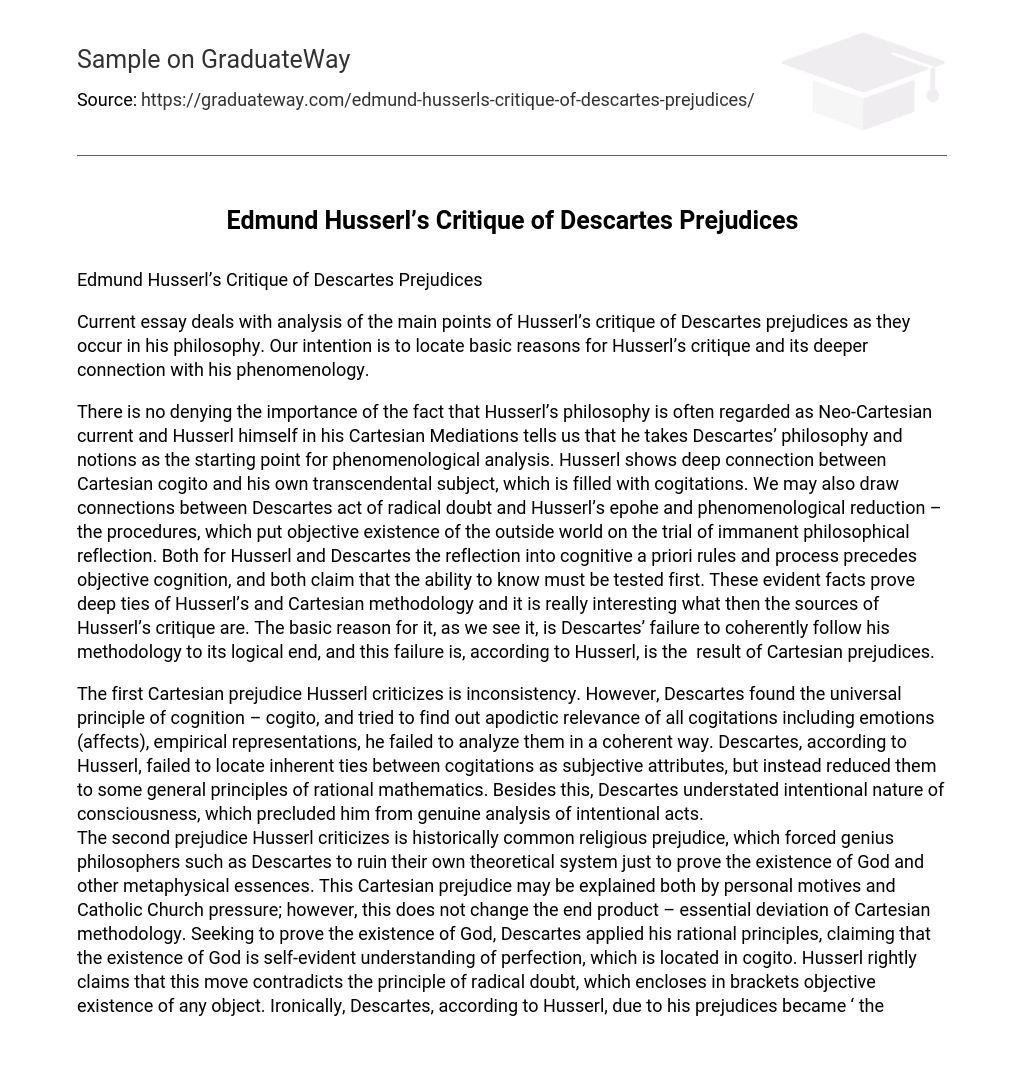Current essay deals with analysis of the main points of Husserl’s critique of Descartes prejudices as they occur in his philosophy. Our intention is to locate basic reasons for Husserl’s critique and its deeper connection with his phenomenology.
There is no denying the importance of the fact that Husserl’s philosophy is often regarded as Neo-Cartesian current and Husserl himself in his Cartesian Mediations tells us that he takes Descartes’ philosophy and notions as the starting point for phenomenological analysis. Husserl shows deep connection between Cartesian cogito and his own transcendental subject, which is filled with cogitations. We may also draw connections between Descartes act of radical doubt and Husserl’s epohe and phenomenological reduction – the procedures, which put objective existence of the outside world on the trial of immanent philosophical reflection. Both for Husserl and Descartes the reflection into cognitive a priori rules and process precedes objective cognition, and both claim that the ability to know must be tested first. These evident facts prove deep ties of Husserl’s and Cartesian methodology and it is really interesting what then the sources of Husserl’s critique are. The basic reason for it, as we see it, is Descartes’ failure to coherently follow his methodology to its logical end, and this failure is, according to Husserl, is the result of Cartesian prejudices.
The first Cartesian prejudice Husserl criticizes is inconsistency. However, Descartes found the universal principle of cognition – cogito, and tried to find out apodictic relevance of all cogitations including emotions (affects), empirical representations, he failed to analyze them in a coherent way. Descartes, according to Husserl, failed to locate inherent ties between cogitations as subjective attributes, but instead reduced them to some general principles of rational mathematics. Besides this, Descartes understated intentional nature of consciousness, which precluded him from genuine analysis of intentional acts.
The second prejudice Husserl criticizes is historically common religious prejudice, which forced genius philosophers such as Descartes to ruin their own theoretical system just to prove the existence of God and other metaphysical essences. This Cartesian prejudice may be explained both by personal motives and Catholic Church pressure; however, this does not change the end product – essential deviation of Cartesian methodology. Seeking to prove the existence of God, Descartes applied his rational principles, claiming that the existence of God is self-evident understanding of perfection, which is located in cogito. Husserl rightly claims that this move contradicts the principle of radical doubt, which encloses in brackets objective existence of any object. Ironically, Descartes, according to Husserl, due to his prejudices became ‘ the father of transcendental realism’ (Husserl, 1977, Ch. 1).
Moreover, Husserl criticizes Cartesian vision of consciousness as identical essence. This, according to Husserl, prevents Descartes from analyzing intentional and noematic content of consciousness, which in fact constitutes the totality of living world. That is why Descartes did not manage to go beyond rationalistic and ontological prejudices and did not reach the transcendental level of research, which is, according to Husserl, may be regarded as the major fault of Cartesian philosophy. These prejudices are very much common in philosophy after Descartes and were first overcome by Kant in his Critique of Pure Reason.
To sum it up, we have analyzed Husserl’s criticism of Cartesian philosophy prejudices. It was revealed that Husserl’s critique is motivated by his own philosophical intention and general Zeitgeist of Husserl’s era. Husserl’s criticism mainly focuses on Descartes method’s inconsistency, religious prejudices, ontological realism, and rationalism. In our view, from the standpoint of Husserl’s methodological position, the abovementioned criticism was absolutely grounded and coherent.
Works Cited
Husserl, Edmund. Cartesian Meditations: An Introduction to Phenomenology. Berkeley: Springer, 1977.
Cerbone R. David Understanding Phenomenology. McGill-Queen’s University Press, 2006.
;





